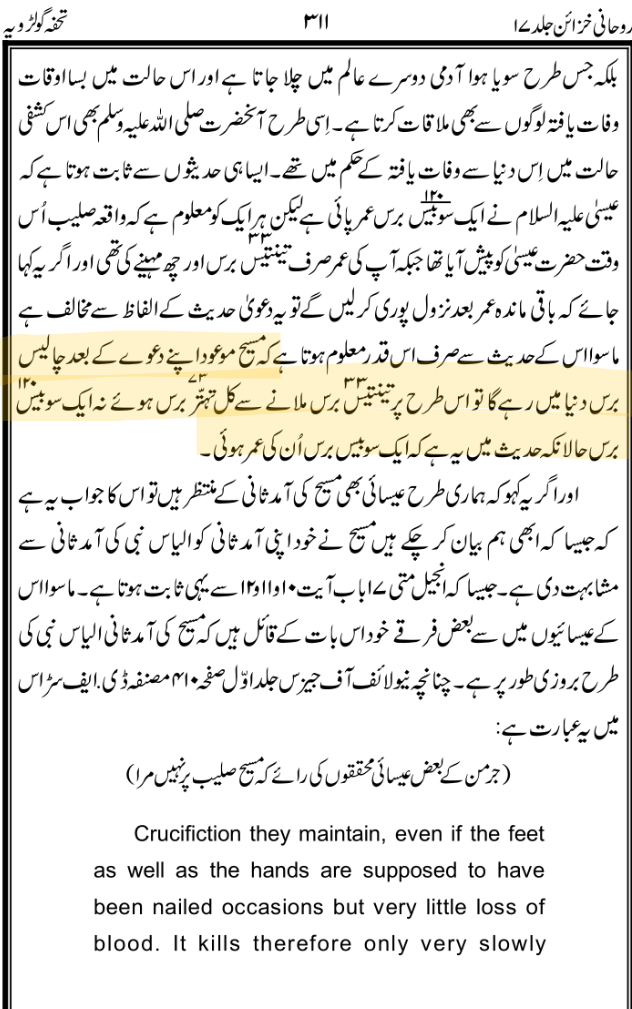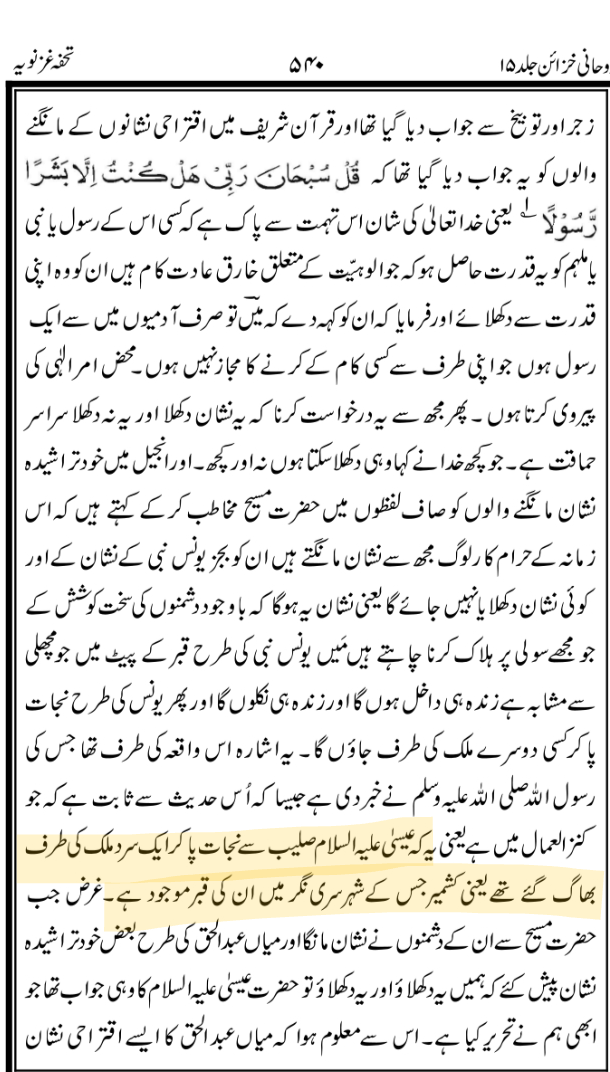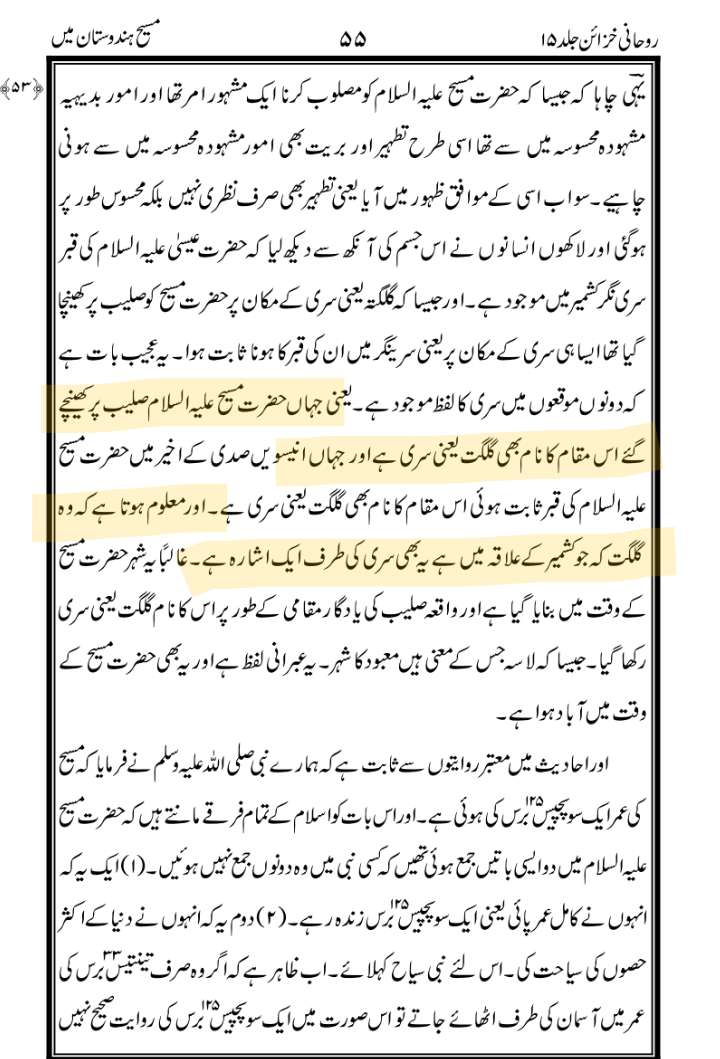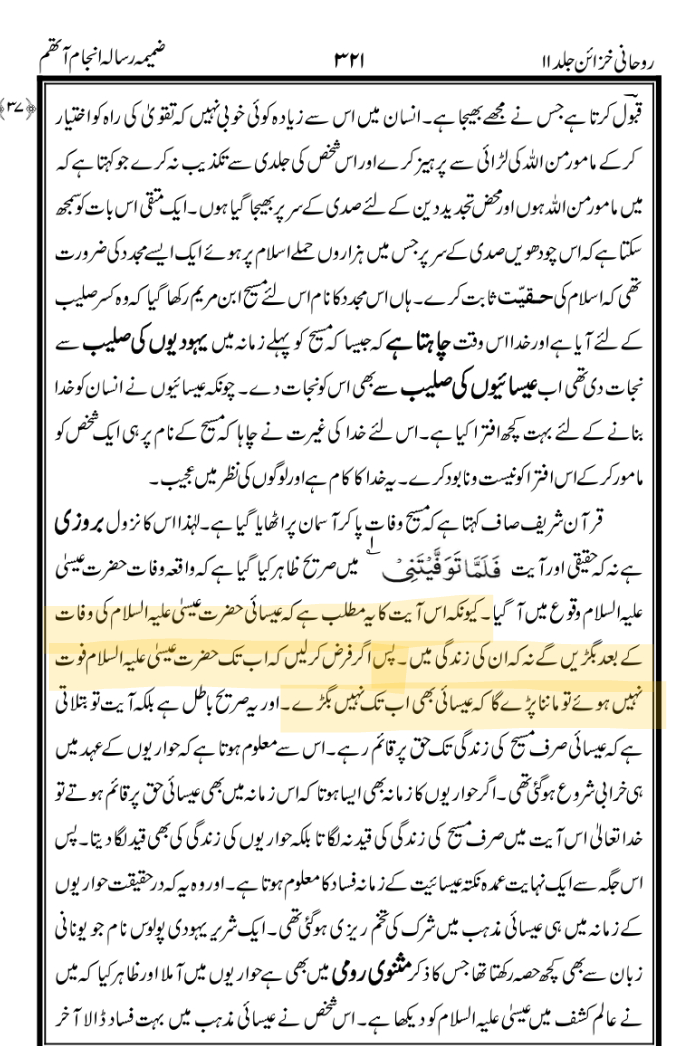The claim that Christians went astray only after the death of Jesus (AS) is baseless and without evidence. The argument presented to support this proves the life of Jesus (AS) rather than his death. The Holy Quran states:
وَ كُنتُ عَلَیۡهِمۡ شَهِیۡدًا مَّا دُمۡتُ فِیۡهِمۡ
“I was a witness over them while I was among them.”
This verse implies that there must be a period when Jesus (AS) was not among his people yet remained alive. That is why it says “مَّا دُمۡتُ فِیۡهِمۡ” (while I was among them) instead of “مَا دُمۡتُ حَیًّا” (while I was alive), as used elsewhere in the Quran, such as in Surah Maryam regarding prayer and charity.
The fact that Jesus (AS) will say “مَّا دُمۡتُ فِیۡهِمۡ” on the Day of Judgment indicates that before the Day of Judgment, there must have been a time when he was absent from his people but still alive, which refers to his ascension to the heavens.
Furthermore, Mirza Ghulam Ahmad Qadiani himself admitted that Christians had already gone astray during the lifetime of Jesus (AS). He states that when the event of crucifixion occurred, Jesus (AS) was 33 years and 6 months old:
“The crucifixion event took place when Jesus (AS) was about 33 years and 6 months old.”
(Tuhfa Golarwiyya, p. 127, Ruhani Khazain vol. 17, p. 311)

He further claims that Jesus (AS) survived crucifixion and traveled to Kashmir:
“As proven by the hadith in Kanz-ul-Ummal, Jesus (AS) was saved from crucifixion and fled to a cold region, which was Kashmir.”
Tuhfa Ghaznawiyya, Ruhani Khazain vol. 15, p. 540

Christ in India, Khazain Vol. 15, p. 55,

Additionally, Mirza Ghulam Ahmad Qadiani wrote that the introduction of Trinity and other corrupt beliefs into Christianity was the work of Paul. This means that while Jesus (AS) had left, Paul was the one who spread these false teachings:
“A wicked Jew named Paul caused great corruption in Christianity.”
(Zameema Anjam-e-Atham, p. 37, Ruhani Khazain vol. 11, p. 321)

He further writes:
“Not even thirty years had passed since the Gospel was revealed when, instead of worshiping God, the worship of a mortal man took its place. Jesus (AS) was made into a god, and salvation was linked to belief in his crucifixion and being the son of God.”
Chashma-e-Ma’arifat, p. 254, Ruhani Khazain vol. 23, p. 266

These references from Qadiani literature confirm that Christians had already gone astray during the lifetime of Jesus (AS). Since it is now established that Christians deviated while Jesus (AS) was still alive, the Qadiani argument—“If Jesus (AS) is alive, then Christians should not have gone astray”—is proven false.
A question for Qadianis: You also believe that there was a period in Jesus’ (AS) life when he was alive but not among his people. We believe the same. The only difference is that we say he is alive in the heavens, while you claim he traveled to Kashmir.
Now, Allah sent Jesus (AS) as a messenger to the Israelites, and before the arrival of Prophet Muhammad (SAW), prophets were sent only to specific nations. Prophets are commanded to preach to their people. If we accept the Qadiani belief that Jesus (AS) abandoned his people and went to Kashmir, then this would mean that Jesus (AS) disobeyed God’s command to preach. This is an insult to Jesus (AS).
If Qadianis argue that the people of Kashmir were also Israelites, then their own publication “Tashheez-ul-Azhan” contradicts this by acknowledging that Indian nations were separate from the Israelites.
In summary, according to the Qadiani belief, Jesus (AS) abandoned his people and his divine mission, which is a blasphemous claim. On the other hand, our belief—that Jesus (AS) is alive in the heavens—does not entail any disrespect to him.
Conclusion:
- The Qadiani claim that Christians went astray only after Jesus’ (AS) death is false.
- Christians had already deviated during the lifetime of Jesus (AS).
- Mirza Ghulam Ahmad Qadiani’s own writings contradict the Qadiani stance.
- The belief in the ascension of Jesus (AS) is supported by the Quran and Hadith, whereas the Qadiani belief creates internal contradictions.